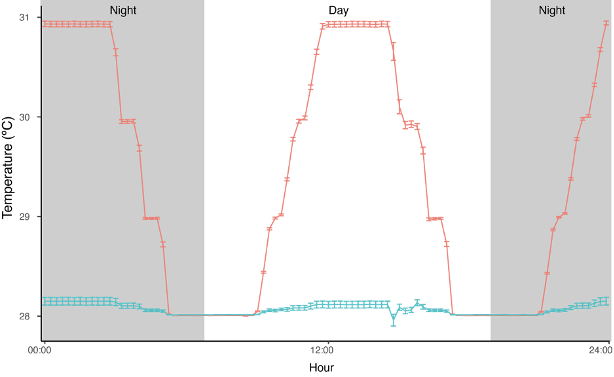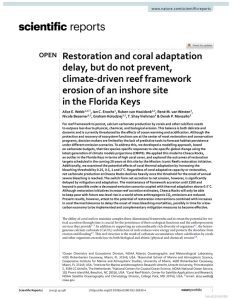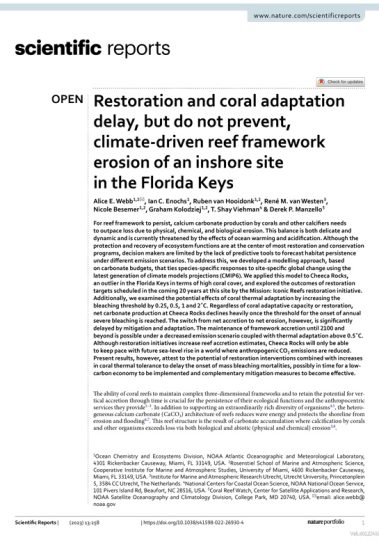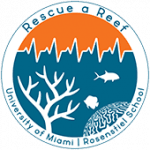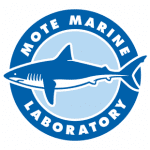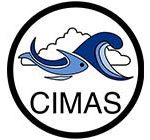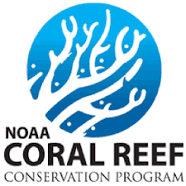Coral Restoration and Resilience
Informing and Enhancing Coral Restoration
Who We Are
What We Do
Coral Reefs are being damaged by climate change, pollution, ship groundings, and disease. Coral cover is declining worldwide, and widespread ecological degradation has impacted the structure, function, and services that reef ecosystems provide. To begin to address this, reef restoration practitioners are growing and outplanting corals to degraded reefs on a scale that has never been attempted before. NOAA AOML seeks to increase the efficiency and efficacy of these efforts to ensure that reefs persist for generations to come.
Our restoration research has three major themes: 1. Identification of resilient coral species that may withstand challenging environmental conditions, 2. Stress-hardening corals so that they are better prepared for a suboptimal environment, and 3. Development of tools for more efficient and effective restoration.
Read More News
Research Impacts & Key Findings
AOML’s Coral Restoration and Resilience research provides invaluable and essential information for understanding the effects of climate change on coral reefs and identifying techniques that will help restore and ensure coral reef resiliency into the future. The Coral Program’s Acropora cervicornis Data Coordination Hub is a collaborative research effort to serve the restoration and scientific community in their efforts to restore populations of A. cervicornis. The database was built as a decision support tool for the restoration community. To date, 23 datasets have been submitted, 248 unique genotypes have been analyzed and 41 unique traits measured.
AOML’s Coral Restoration and Resilience research has found that corals exposed to variable temperature treatment in the laboratory for 90 days were better able to withstand the warmer ocean temperatures caused by climate change. The temperature-treated corals were also less likely to succumb to bleaching, while untreated corals experienced more rapid tissue loss and necrosis. These findings offer coral restoration scientists with a new approach to potentially increase the success rate of planting nursery-raised staghorn coral onto degraded reefs. Currently, tens of thousands of acroporid colonies are raised and outplanted on Florida’s coral reef every year, with >70% survivorship observed one year after outplanting.
Stress-Hardening Corals
AOML is working to identify effective stress hardening techniques to increase coral resilience to thermal stress as a means of improving coral survival in the field. Find out more about how researchers at AOML are using state of the art technology from the Environmental Reef Lab to pursue avenues of increased resilience for corals.
Experiments in the Environmental Reef Lab
To investigate applied methods for coral restoration, Florida genotypes of staghorn coral (Acropora cervicornis) were collected from the University of Miami Rescue a Reef in situ coral nursery and brought back to Environmental Reef Lab to apply a long-term variable temperature treatment using the automated and independently-controlled tank system. After the three-month temperature treatment, the coral fragments were run through a 32 ºC heat-stress assay in order to assess the efficacy of the prior variable temperature treatment in enhancing their thermal resilience.
Image: Dr. Allyson DeMerlis collecting staghorn corals from the University of Miami Rescue a Reef in situ coral nursery for the thermal stress-hardening experiment.
Increased Thermal Tolerance
Researchers found that this prior treatment did indeed enhance their thermal tolerance, allowing corals to persist significantly longer in the heat-stress assay than their control counterparts. Additionally, the corals that had been temperature-treated were less likely to succumb to bleaching, while untreated corals more rapidly succumbed to rapid tissue loss and necrosis. The results of this experiment indicate that thermal stress-hardening is effective for staghorn corals, however more experimentation is necessary to understand how long this thermal resilience is retained.
Image: Fragments of staghorn coral introduced to the 32 ºC heat-stress assay after their three-month variable temperature treatment to observe if prior treatment enhanced their thermal tolerance.
Identify Resilient Coral Genotypes
Resiliency and Resistance to Environmental Stressors
Scientists are working to identify coral genotypes that are more resistant to ocean acidification, nutrient, and thermal stress, along with disease resistance. These features are an important part of the continued survival of coral reefs as ocean acidification and warming worsen. Identification of resilient and resistant coral can serve as a tool to enhance restoration efforts in building more resilient reefs for the future.
The CRANG system along with other open source designs were developed in AOML’s Advanced Manufacturing and Design Lab. This lab was created to be a resource for scientists and collaborators to build and explore new technologies for enhancing coral research and data collection.
Image: Computer-aided design (CAD) of the Coral Rapid Assessment of Net Growth (CRANG) system for rapid evaluation of coral genotype performance. The system includes real-time measurement of pH, dissolved oxygen, temperature, and automates water sampling for carbonate chemistry analysis.
Corals Persisting in Unique Conditions
Some naturally resilient coral genotypes lend credence to the concept of stress hardening. Two study sites for the lab include an Urban site with resilient coral in less than ideal conditions, and an oceanic thermal CO2 vent site off the coast of Mayreau in St. Vincent and the Grenadines that has coral thriving in the presence of periodically drawn down pH conditions, that common sense dictates would prevent coral growth and survival.
AOML’s Coral Program has ongoing studies at several of these Urban coral sites to 1) characterize environmental and oceanographic conditions, 2) identify differences at the molecular level among urban corals and corals from natural offshore reefs, and 3) map benthic habitats and quantify community composition.
Image: Brain coral from a reef off the coast of the island of Mayreau. This unique volcanic vent site consisted of high carbon dioxide partial pressures (released from the volcanic vent) and low pH conditions.
Coral Genotype Performance Database
Coral genotype assessment for physiological performance (e.g. growth rates, skeletal density, outplanting survivorship) informs manager decisions when outplanting cohorts of coral to restore and enhance coral reefs. A phenotypic traits database inclusive of all nursery genotypes will act as a clearinghouse to identify coral for outplanting selection and enhanced nursery grow out to maximize coral restoration success and further our understanding of the coral features most conducive to that success in our changing oceans.
Visit the Acropora Cervicornis Data Coordination Hub a decision support tool created by NOAA’s Atlantic Oceanographic and Meteorological Laboratory Coral Program to assimilate disparate datasets of Acropora cervicornis to identify genotypes harboring resilient phenotypes.

Experimental Reef Lab
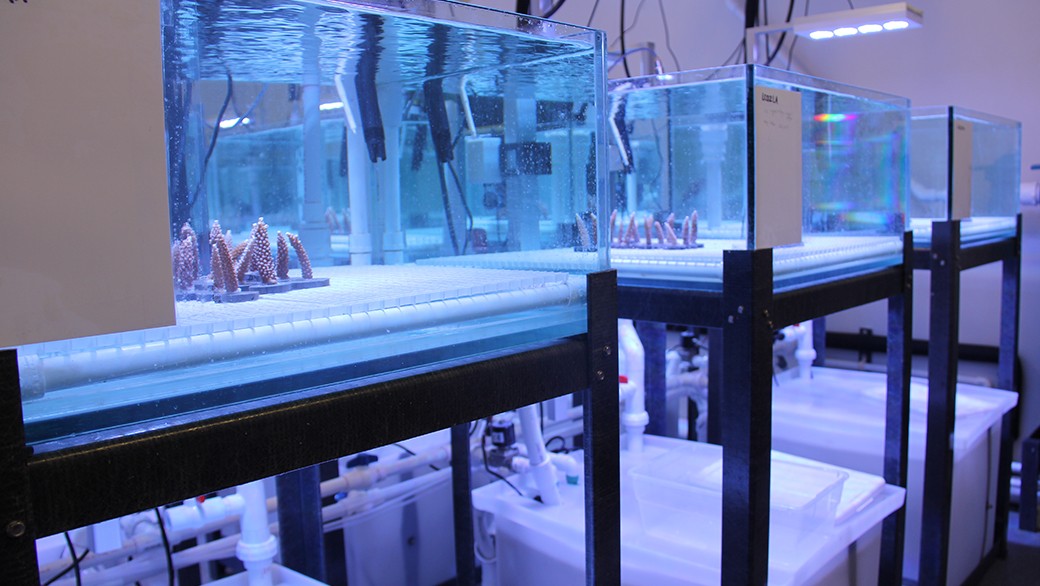
The Experimental Reef Laboratory is located on the University of Miami’s Virginia Key campus at the Rosenstiel School of Marine and Atmospheric Science. This unique experimental facility was designed to study the combined effect of heat stress and ocean acidification on corals so that scientists can see how coral organisms respond at the molecular level (DNA and RNA) under present and possible future conditions.
By building in-house facilities such as these, we can fulfill critical gaps in equipment, increase efficiency and integrity of sample processing, and offer a place for partners such as the Southeast Fisheries Science Center and others to collaborate on new research projects.









